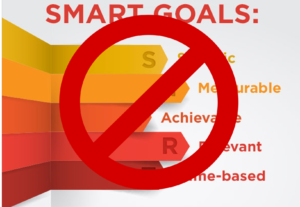
Why SMART Goals Can Be So Dumb
Breaking the myth about SMART goals
One of the big myths in employee development is that people are motivated by goals, or that goal setting is inherently motivating.

If I’m planning a trip, my knowing the destination, knowing where I have to get to, doesn’t make the trip any more desirable or annoying. Why I’m going to wherever I’m going to, now that tends to have an impact. Maybe it’s to see an old friend I haven’t seen in 5 years. Or maybe it’s for a funeral. Two different reasons. Two different motivations.
Staying with the trip analogy, if I use Waze so I know precisely where I need to get to, exactly how far the trip will be, and how long it should take, that still won’t really add fundamentally to my motivation for getting there.
SMART goals anyone?
Yet somehow we feel that all this applies to goal setting. SMART goals anyone? [SMART Goals: Goals that are Specific, Measurable, Attainable/Actionable, Realistic/Relevant, and Time-bound.] Truly, just because we have people using SMART goals doesn’t mean they’ll have great desire to pursue them.
A few things to add
Instead of getting caught up in the precision and micro-measurement of our goals, how about adding the following:
- Will the goals you set with your people contribute to more than your organization’s success? i.e. will they contribute to the success (growth, capabilities, sense of self worth, etc.) of the person pursuing the goals? How so? Do you know the person well enough to even answer the question?
- Is the goal more than just a “If you do this, you get to keep your job” type of goal? Obviously all goals can’t be about self-actualization and achieving existential enlightenment, but on balance, is there much in the goal setting and the goals themselves for the individual?
- Even if the goal itself is sterile (i.e. increase/reduce X attribute by Z%), can the process to achieving the goal be engaging? Can you as the person’s manager, make it more engaging?
What’s your their experience like?
Ask anyone who’s ever trained for a running race about getting to the finish line, and he or she will at some point discuss the training and preparation, i.e. that much longer process that leads to the final destination. People will train 3 – 5 months, to run a 3- to 5-hour marathon. And if the training process is a wretched experience, I guarantee you, few will have the stamina to even show up on race day.
The same is true for goal setting. Have a look beyond the SMART goals themselves. Is the process of achieving the goals of any value to your people pursuing them?
Sign up for The Advisory Alliance 60-Second Read
Categories
- board of directors
- career
- career development
- change
- coaching
- communication
- compensation
- conflict
- consulting
- critical thinking
- culture
- decision-making
- education
- experiential learning
- feedback
- high potential
- hr
- immigration
- influence
- innovation
- jobs
- knowledge economy
- leadership
- leadership development
- leadership style
- learning
- management
- management development
- motivation
- selection
- self-actualization
- skills shortage
- succession planning
- talent development
- talent management
- time management
- uncategorized
